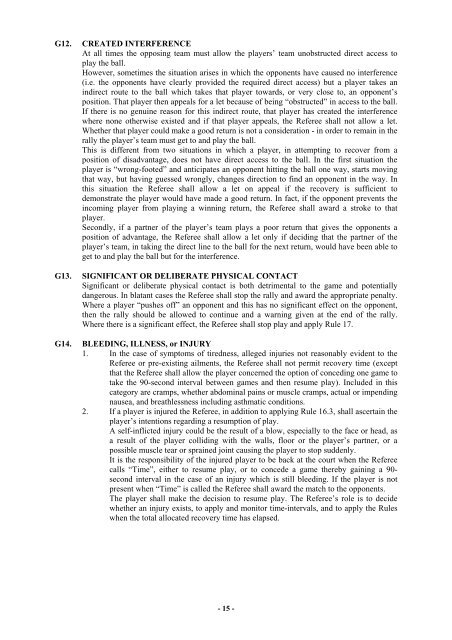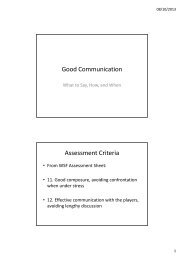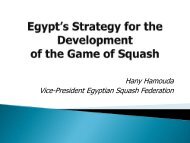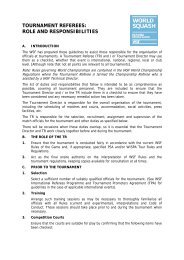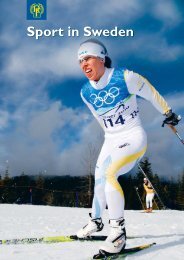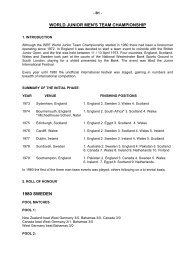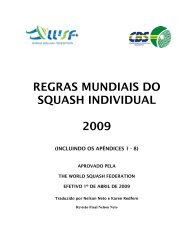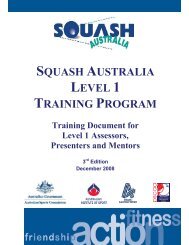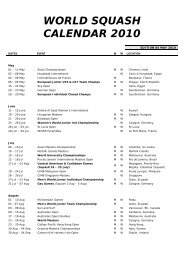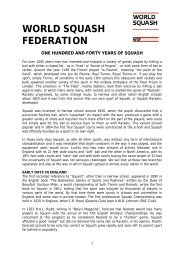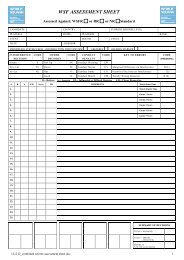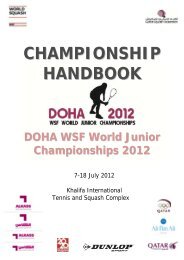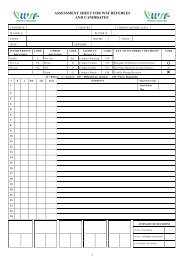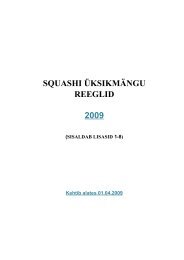International Doubles - World Squash Federation
International Doubles - World Squash Federation
International Doubles - World Squash Federation
Create successful ePaper yourself
Turn your PDF publications into a flip-book with our unique Google optimized e-Paper software.
G12. CREATED INTERFERENCEAt all times the opposing team must allow the players’ team unobstructed direct access toplay the ball.However, sometimes the situation arises in which the opponents have caused no interference(i.e. the opponents have clearly provided the required direct access) but a player takes anindirect route to the ball which takes that player towards, or very close to, an opponent’sposition. That player then appeals for a let because of being “obstructed” in access to the ball.If there is no genuine reason for this indirect route, that player has created the interferencewhere none otherwise existed and if that player appeals, the Referee shall not allow a let.Whether that player could make a good return is not a consideration - in order to remain in therally the player’s team must get to and play the ball.This is different from two situations in which a player, in attempting to recover from aposition of disadvantage, does not have direct access to the ball. In the first situation theplayer is “wrong-footed” and anticipates an opponent hitting the ball one way, starts movingthat way, but having guessed wrongly, changes direction to find an opponent in the way. Inthis situation the Referee shall allow a let on appeal if the recovery is sufficient todemonstrate the player would have made a good return. In fact, if the opponent prevents theincoming player from playing a winning return, the Referee shall award a stroke to thatplayer.Secondly, if a partner of the player’s team plays a poor return that gives the opponents aposition of advantage, the Referee shall allow a let only if deciding that the partner of theplayer’s team, in taking the direct line to the ball for the next return, would have been able toget to and play the ball but for the interference.G13. SIGNIFICANT OR DELIBERATE PHYSICAL CONTACTSignificant or deliberate physical contact is both detrimental to the game and potentiallydangerous. In blatant cases the Referee shall stop the rally and award the appropriate penalty.Where a player “pushes off” an opponent and this has no significant effect on the opponent,then the rally should be allowed to continue and a warning given at the end of the rally.Where there is a significant effect, the Referee shall stop play and apply Rule 17.G14. BLEEDING, ILLNESS, or INJURY1. In the case of symptoms of tiredness, alleged injuries not reasonably evident to theReferee or pre-existing ailments, the Referee shall not permit recovery time (exceptthat the Referee shall allow the player concerned the option of conceding one game totake the 90-second interval between games and then resume play). Included in thiscategory are cramps, whether abdominal pains or muscle cramps, actual or impendingnausea, and breathlessness including asthmatic conditions.2. If a player is injured the Referee, in addition to applying Rule 16.3, shall ascertain theplayer’s intentions regarding a resumption of play.A self-inflicted injury could be the result of a blow, especially to the face or head, asa result of the player colliding with the walls, floor or the player’s partner, or apossible muscle tear or sprained joint causing the player to stop suddenly.It is the responsibility of the injured player to be back at the court when the Refereecalls “Time”, either to resume play, or to concede a game thereby gaining a 90-second interval in the case of an injury which is still bleeding. If the player is notpresent when “Time” is called the Referee shall award the match to the opponents.The player shall make the decision to resume play. The Referee’s role is to decidewhether an injury exists, to apply and monitor time-intervals, and to apply the Ruleswhen the total allocated recovery time has elapsed.- 15 -


